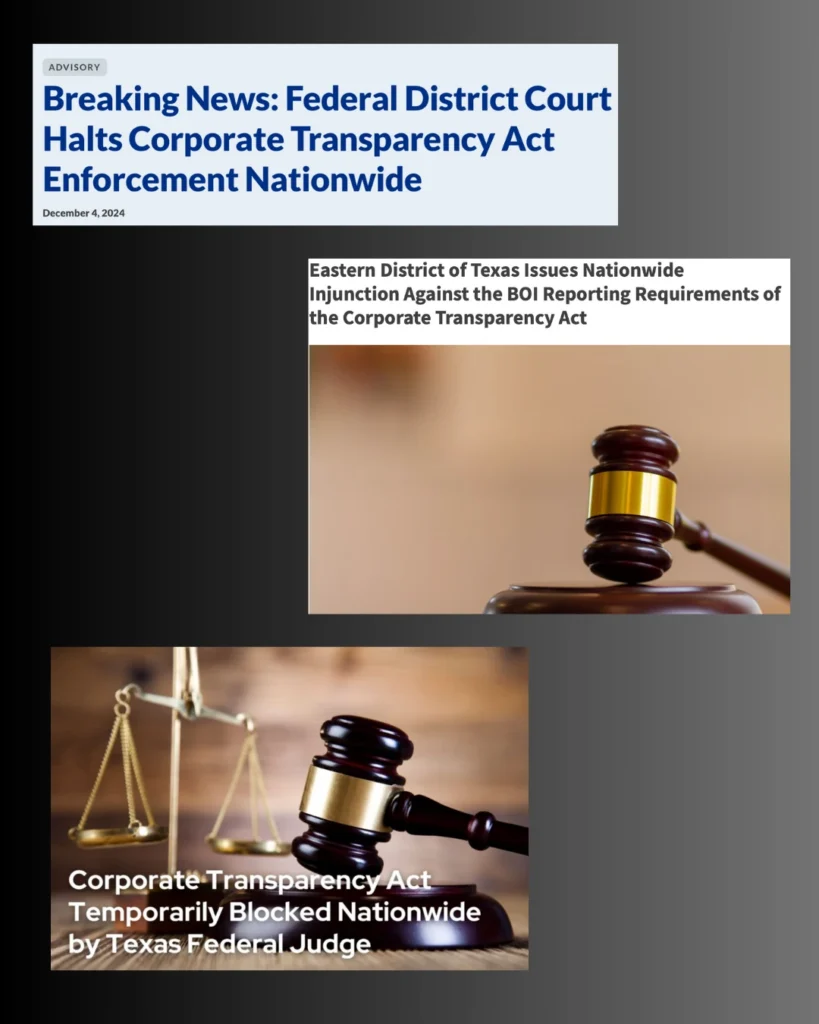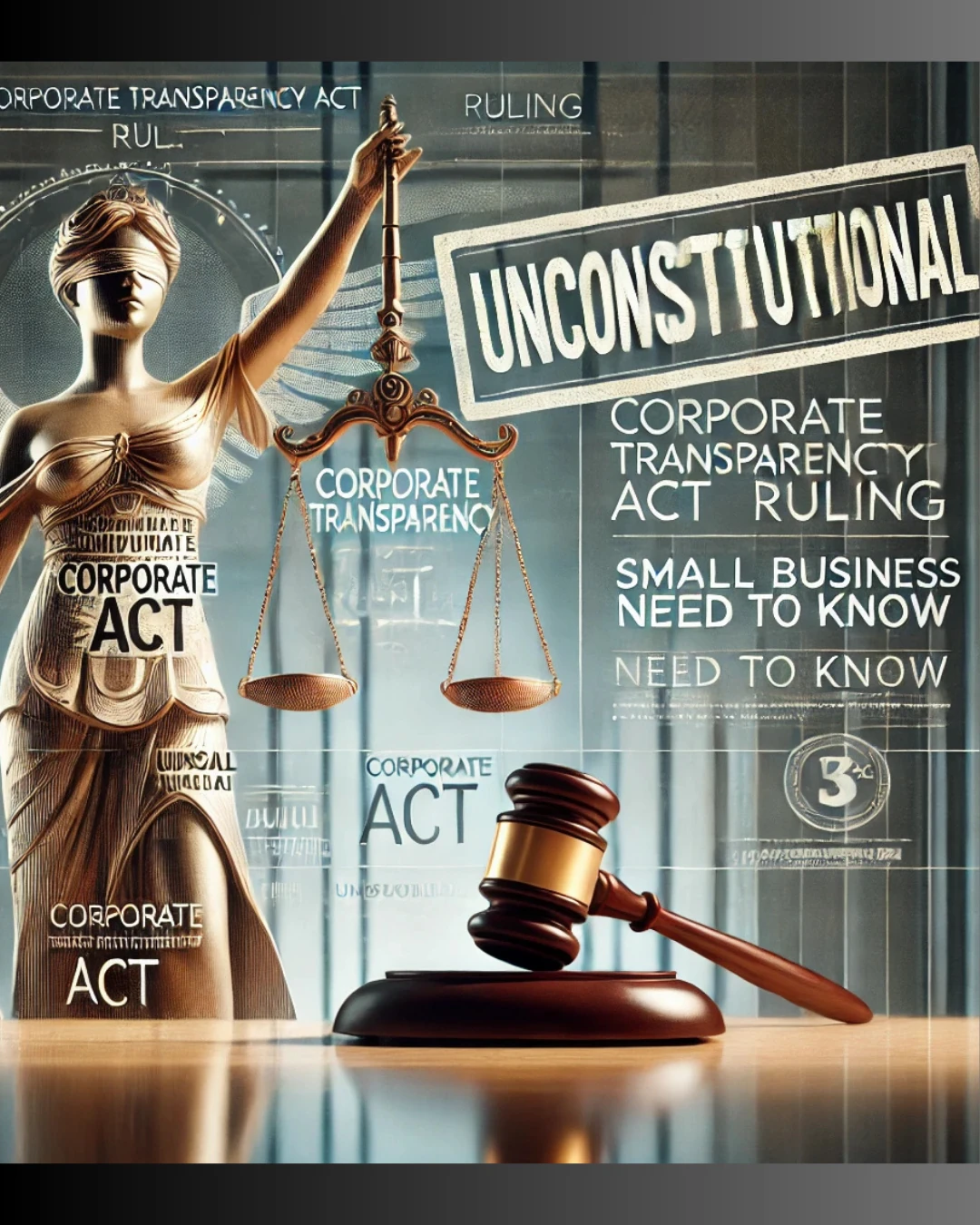Your small business just dodged a federal bullet. Here’s why the Corporate Transparency Act ruling matters.
When it comes to your business and your privacy, this ruling might just change the game.

The Corporate Transparency Act Ruling: What Small Business Owners Need to Know
If you’ve been scrambling to file your beneficial ownership information (BOI) report to meet the looming January 1, 2025, deadline, you can take a deep breath. On December 3, 2024, a federal judge from the U.S. District Court for the Eastern District of Texas issued a sweeping injunction blocking the enforcement of the Corporate Transparency Act (CTA) nationwide.
So, what does this mean for you, your business, and the broader economic landscape? Let’s break it all down.
What Was the Corporate Transparency Act Trying to Do?
The CTA was introduced as a measure to combat financial crimes like money laundering and terrorism financing. By requiring over 32 million U.S. companies to file sensitive ownership information with the Financial Crimes Enforcement Network (FinCEN), Congress aimed to eliminate anonymity in business ownership.
But here’s where things got tricky. The CTA didn’t just ask for your business’s name and address—it demanded detailed information on all “beneficial owners,” including:
- Full names
- Dates of birth
- Residential addresses
- Identification documents (like driver’s licenses or passports)
And if you failed to comply? Penalties included $10,000 fines, $591 daily charges, and up to two years in prison.

The Court’s Ruling: Why It Matters
The Corporate Transparency Act ruling on December 3 wasn’t just a pause button—it was a bold declaration that the CTA overstepped its bounds. Let’s unpack the key points of Texas Top Cop Shop, Inc., et al. v. Garland, et al., Case No. 4:24-cv-478 (E.D. Tex.):
- Unconstitutional Overreach:
The court likened the CTA to a “quasi-Orwellian” overreach by Congress, stating it violated the Fourth Amendment, which protects against unreasonable searches and seizures. - A Threat to Federalism:
Judge Mazzant argued that allowing Congress to regulate such granular aspects of small businesses could set a dangerous precedent for unchecked federal power. - Nationwide Protection:
The injunction doesn’t just apply to Texas—it blocks the CTA’s enforcement across the entire country. No business, new or existing, is required to comply with the BOI filing requirements for now.
What Does the Corporate Transparency Act Ruling Mean for Small Business Owners?
If you’re part of the estimated 32 million businesses affected by the CTA, here’s what you need to know:
- No Filing Necessary:
The ruling means that you do not need to submit your BOI report by the January 1, 2025, deadline—or at all, until further notice. - Penalties Are Paused:
FinCEN cannot impose penalties for non-compliance while the injunction is in place. - Privacy Prevails—for Now:
The ruling underscores the importance of privacy for small businesses. However, appeals are likely, meaning this isn’t the final word.
The Bigger Picture: Why It Happened
The court challenged the CTA’s justification under several legal frameworks, including the Commerce Clause and the Necessary and Proper Clause. Here’s a simplified breakdown:
- Commerce Clause: The court argued that being anonymous isn’t an activity that impacts interstate commerce, making the CTA unconstitutional under this clause.
- Necessary and Proper Clause: The court deemed the CTA too broad, stating it was not incidental to Congress’s power to regulate commerce or protect national security.
Simply put, Congress aimed too high and too wide, and the court called them on it.
What Happens Next?
The federal government is likely to appeal this decision. If it makes it to the Supreme Court, we could see a definitive ruling that shapes not just the CTA’s future but the extent of federal power over small businesses.
Until then, the nationwide injunction stands. Small business owners can take this time to stay informed, review their compliance plans, and keep an eye on further developments.
Why This Matters to You
This new Corporate Transparency Act ruling isn’t just about paperwork—it’s about protecting your rights as a business owner. Imagine the cost and time required to comply with regulations like the CTA. Imagine the potential misuse of your personal information in a massive government database. This ruling is a small victory in a larger battle for privacy and balanced regulation.
Follow us for more insights
Want to stay updated on how these rulings impact your business? Follow Skyline Pivot for insights that empower small business owners to navigate the complexities of modern regulation.
Further Reading:
- To fully understand what the Corporate Transparency Act was, read our article The Corporate Transparency Act: Read here.
- For more insight on this subject, check out the article written by Barnum Attorneys at Law,. Read here.



Leave a Reply